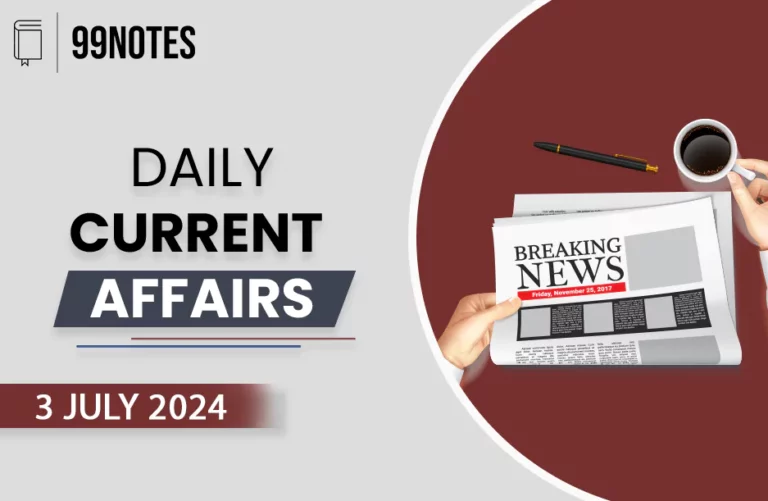29 July 2023 : Daily Current Affairs
DAILY CURRENT AFFAIRS
Daily Current Affairs For UPSC ,Daily Current affairs of The hIndu and Indian Express.
29-July-2023
1. SC asks Centre, six States to respond to plea on lynchings.
Topic: GS2 – Indian polity.
Context:
- The Supreme Court has asked the Centre and six States to respond to a plea regarding recurring lynchings and mob violence.
- The plea highlights that despite a five-year-old Supreme Court judgment holding the government accountable for protecting victims’ lives, incidents of mob fury and vigilantism continue to occur.
Issue of rising instances of mob lynching:
The issue of rising instances of mob lynching is a matter of grave concern in many parts of the world, including India. Mob lynching refers to incidents where a group of people takes the law into their own hands and resorts to violence, resulting in the death of individuals suspected of committing crimes or belonging to specific communities.
Key Points:
- Mob lynching involves groups of people acting as judge, jury, and executioner, bypassing the legal system.
- Lynchings are often fueled by factors like rumors, misinformation, communal tensions, and prejudice.
- Victims are often targeted based on their religion, caste, ethnicity, or even suspicion of criminal activities.
- Lynchings have been reported in both rural and urban areas, facilitated by the spread of fake news and social media.
- The lack of immediate police intervention, delayed justice, and inadequate punishment for perpetrators contribute to the persistence of this problem.
- The incidents have resulted in loss of innocent lives, created fear and insecurity among minority communities, and tarnished the country’s image.
- Activists and organizations have been advocating for stronger legislation, swift action, and awareness campaigns to combat mob violence.
- The judiciary has also played a significant role in addressing this issue through judgments that emphasize accountability and strict punishment for mob lynching perpetrators.
- However, challenges remain in effectively curbing mob lynching due to societal prejudices, political complexities, and the need for collective efforts by authorities, civil society, and citizens.
It is crucial for governments, law enforcement agencies, and civil society to work together to address the root causes of mob lynching and promote a culture of tolerance, respect, and adherence to the rule of law. Education, awareness, and sensitization are essential to challenge the mindset that fuels this dangerous form of vigilantism and to foster a society where justice prevails through legitimate legal channels.
2. Suggest steps to end discrimination against LGBTQIA+ persons: HC
Topic: GS1 – Indian Society.
Context:
- The Bombay High Court asked the Inspector-General (IG), Prisons, of Maharashtra to provide suggestions to prevent discriminatory treatment towards transgender and homosexual individuals in prisons.
- The court was hearing a petition filed by a lesbian couple seeking protection from family members who oppose their relationship.
Discrimination against LGBTQ community:
Discrimination against the LGBTQ (Lesbian, Gay, Bisexual, Transgender, and Queer) community is a persistent and concerning issue worldwide. Members of this community often face prejudice, marginalization, and unequal treatment in various aspects of life, including education, employment, healthcare, and housing.
Key points:
- Social Stigma: LGBTQ individuals frequently encounter social stigma, leading to isolation, mental health challenges, and a sense of alienation from family and society.
- Legal Discrimination: Many countries have laws that criminalize same-sex relationships or fail to provide legal recognition and protection for LGBTQ rights.
- Employment Discrimination: LGBTQ individuals often face discrimination in the workplace, including unequal pay, denial of job opportunities, and workplace harassment.
- Bullying and Violence: LGBTQ youth are vulnerable to bullying and violence in schools and communities, contributing to higher rates of depression and suicide.
- Healthcare Disparities: LGBTQ individuals may encounter barriers to accessing appropriate healthcare due to discrimination by healthcare providers or lack of LGBTQ-inclusive healthcare policies.
- Housing Discrimination: LGBTQ individuals can experience housing discrimination, including rental denials and evictions, based on their sexual orientation or gender identity.
- Family Rejection: Some LGBTQ individuals face rejection and abandonment by their families when they come out, leading to homelessness and precarious living situations.
- Lack of Legal Protections: The absence of comprehensive legal protections in many jurisdictions leaves LGBTQ individuals vulnerable to discrimination and violence without recourse.
- Advocacy Efforts: LGBTQ activists and organizations work tirelessly to advocate for equal rights, anti-discrimination laws, and social acceptance.
- Progress and Challenges: While progress has been made in some regions to advance LGBTQ rights and acceptance, challenges persist, requiring continued advocacy and awareness.
Combatting discrimination against the LGBTQ community requires comprehensive efforts from governments, institutions, and individuals. Legislation must be enacted or strengthened to protect LGBTQ rights, and educational initiatives are needed to promote understanding and tolerance.
3. 2 health Bills passed without debate in LS
Topic: GS2 – Indian Polity.
Context:
- The Lok Sabha passed two health Bills without debate: the National Nursing and Midwifery Commission Bill, 2023, and the National Dental Commission Bill, 2023.
- The National Nursing and Midwifery Commission Bill aims to repeal the Indian Nursing Council Act, 1947, and establish the National Nursing and Midwifery Commission (NNMC).
Issue of lack of debate on bills in Parliament:
The issue of lack of debate on bills in Parliament is a matter of concern for democratic governance. It refers to situations where legislative proposals are passed without comprehensive discussions, critical examination, or adequate input from opposition members and stakeholders.
Key points:
- Democratic Principles: In a functioning democracy, parliamentary debates are essential to ensure robust scrutiny and accountability in the legislative process.
- Inadequate Deliberation: When bills are passed without sufficient debate, lawmakers may not have the opportunity to thoroughly analyze the implications, merits, and drawbacks of proposed laws.
- Limited Input: Opposition members and other stakeholders often have valuable insights and perspectives that contribute to better legislation. The lack of debate may hinder their ability to participate constructively.
- Impact on Legislation: Rushing bills without debate may result in poorly drafted or flawed laws that could lead to unintended consequences.
- Public Representation: Debates allow elected representatives to voice the concerns and interests of their constituents, ensuring public representation in decision-making.
- Suppression of Dissent: The absence of debates can be seen as an attempt to suppress opposing views and curtail the role of the opposition in holding the government accountable.
- Importance of Scrutiny: Debates enable parliamentarians to scrutinize government actions, policy choices, and financial allocations, fostering transparency and checks and balances.
- Enhancing Public Confidence: Transparent and inclusive debates strengthen public confidence in the legislative process and promote public trust in the government.
To address the issue of lack of debate on bills, parliamentary reforms may be required to allocate sufficient time for discussions, encourage bipartisan cooperation, and strengthen the role of parliamentary committees. Public participation and access to information on proposed legislation can also foster greater accountability and democratic engagement.
4. India, Japan will work to strengthen ‘peacetime cooperation’: Jaishankar
Topic: GS2 – International relations.
Context:
- External Affairs Minister S. Jaishankar and visiting Japanese Foreign Minister Yoshimasa Hayashi stressed strong bilateral ties between India and Japan.
Highs in India – Japan relations:
- Both countries are considered “natural partners” in facing the challenges of a future world order and focus on strengthening peacetime cooperation.
- When asked about potential cooperation in case of a conflict in the Taiwan Strait or between India and China at the Line of Actual Control (LAC), Jaishankar emphasized working to strengthen cooperation in various domains like economics, supply chains, digital domain, critical technologies, and maritime security.
- Japanese Foreign Minister Hayashi mentioned existing security cooperation, including military and maritime exercises, as well as defense cooperation in response to a question about Japan’s reaction to conflicts in the Indo-Pacific region.
- India and Japan recommit to a 5-trillion yen target for Japanese investment in India for the period 2022-2027 during the 15th annual India-Japan Foreign Ministers’ Strategic Dialogue.
- Japan’s new Indo-Pacific policy has a special focus on ties with India, including projects in third countries like Sri Lanka and Bangladesh.
- Japan is keen on aligning its G-7 presidency goals with India’s G-20 priorities and involving the Global South in cooperation on urgent issues.
- Japan’s Foreign Minister is on a tour to South Asia and Africa, visiting Sri Lanka, Maldives, South Africa, Uganda, and Ethiopia.
5. Modi says India can become hub of chip-making industry
Topic: GS3 – Indian economy.
Context:
- Prime Minister Narendra Modi inaugurated the ‘Semicon India 2023’ conclave in Gujarat, making a strong pitch to global investors to invest in India’s semiconductor and chip-making industry.
- He emphasized India’s goal to become a global hub for semiconductor manufacturing and highlighted the country’s commitment to attracting global players to set up their plants and supply chain networks in India.
More information about the news:
- The government has undertaken policy reforms and tax incentives to expedite the growth of the semiconductor sector.
- Modi mentioned India’s internet penetration, fibre infrastructure, availability of talent, large market, attractive corporate tax system, and political stability as factors that make India an appealing investment destination.
- He highlighted the rapid development driven by India’s future aspirations, including the reduction in extreme poverty and widespread availability of affordable data connectivity across the country.
- India’s electronic manufacturing sector has grown from $30 billion to over $100 billion, and the country has seen rising electronic manufacturing exports and the establishment of more than 200 mobile manufacturing units.
- S. chipmaker Advanced Micro Devices (AMD) announced plans to invest around $400 million in India over the next five years and build its largest design center in Bengaluru.
- Taiwan-based Foxconn chairman Young Liu expressed optimism about India and the government’s determination, stating that Foxconn is focusing on India for its plant.
Significance: News underlines developments in India’s chip industry and examples to add in mains answer.
6. Land-use changes putting rocky addresses of animals under stress in Sahyadri plateau.
Topic: GS3 – environment.
Context:
- The shift from traditional local grain cultivation to monoculture plantations of mango and cashew in Maharashtra’s Sahyadri plateaus is affecting elusive amphibians, insects, and reptiles that live under loose rocks.
More information about the news:
- A team of five scientists conducted a study to understand how animals, including the white-striped viper gecko, Seshachari’s caecilian, saw-scaled viper, ants, spiders, and scorpions, are responding to changes in land-use patterns.
- The loose rocks provide shelter to these animals from extreme weather conditions, but the rapid change in agricultural trends, including the expansion of mango orchards, is impacting their habitats.
- The study revealed that many of the animals living under the rocks are rare, and their adaptability to the changing conditions may not be sufficient to cope with the pace of land-use shift.
7. Govt. allows Indian companies to list on foreign exchanges through IFSC
Topic: GS3 – Indian economy.
Context:
- Indian companies can now directly list their shares on foreign exchanges operating at the GIFT City-based International Financial Services Centre (IFSC) in Gujarat.
More information about the news:
- The government has enabled direct listing of listed and unlisted companies on the IFSC exchanges, allowing Indian firms to access global capital at better valuations.
- Finance Minister Nirmala Sitharaman inaugurated a Limited Purpose Clearing Corporation (LPCC) mechanism called AMC Repo Clearing Ltd. (ARCL) and the Corporate Debt Market Development Fund (CDMDF) in Mumbai to develop a vibrant corporate bond market in India.
- The LPCC will clear and settle corporate bond repo transactions, enhancing liquidity in the underlying corporate bond market and providing cost-effective funding for market makers.
For Enquiry

29 July 2023 : Daily Current Affairs

28 July 2023 : Daily Quiz

28 July 2023 : PIB

28 July 2023 : The Hindu Editorial Notes PDF

28 July 2023 : Daily Current Affairs

27 July 2023 : Daily Quiz

27 July 2023 : PIB

27 July 2023 : The Hindu Editorial Notes PDF

27 July 2023 : Daily Current Affairs

26 July 2023 : Daily Quiz
Daily Current Affairs 29 July 2023 : Daily Current Affairs DAILY CURRENT AFFAIRS
Daily Current Affairs For UPSC ,Daily Current affairs of The hIndu and Indian Express.
28-July-2023
Facebook-f
Twitter
Youtube
1. G-20:…
Daily Quiz 28 July 2023 : Daily Quiz 28 July 2023 : Daily Quiz…
PIB 28 July 2023 : PIB PRESS INFORMATION BUREAU
28-July-2023
Daily Current Affairs For UPSC ,The PIB ( Press Information Bureau…
The Hindu 28 July 2023 : The Hindu Editorial Notes PDF The Hindu Editorial
28-July-2023
Daily Current Affairs For UPSC ,The Hindu Editorial Summary
Facebook-f
Twitter
Youtube
1. Weighing…
Daily Current Affairs 28 July 2023 : Daily Current Affairs DAILY CURRENT AFFAIRS
Daily Current Affairs For UPSC ,Daily Current affairs of The hIndu and Indian Express.
28-July-2023
Facebook-f
Twitter
Youtube
1. G-20:…
Daily Quiz 27 July 2023 : Daily Quiz 27 July 2023 : Daily Quiz…
PIB 27 July 2023 : PIB PRESS INFORMATION BUREAU
27-July-2023
Daily Current Affairs For UPSC ,The PIB ( Press Information Bureau…
The Hindu 27 July 2023 : The Hindu Editorial Notes PDF The Hindu Editorial
27-July-2023
Daily Current Affairs For UPSC ,The Hindu Editorial Summary
Facebook-f
Twitter
Youtube
1. Shedding…
Daily Current Affairs 27 July 2023 : Daily Current Affairs DAILY CURRENT AFFAIRS
Daily Current Affairs For UPSC ,Daily Current affairs of The hIndu and Indian Express.
27-July-2023
Facebook-f
Twitter
Youtube
1. No-trust…
Daily Quiz 26 July 2023 : Daily Quiz 26 July 2023 : Daily Quiz…



